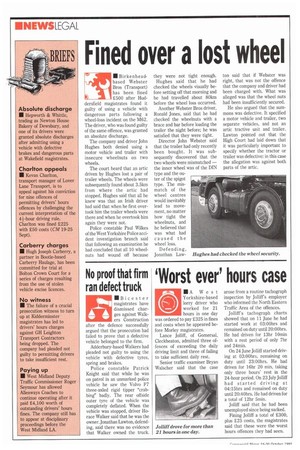Fined over a lost wheel
Page 18

If you've noticed an error in this article please click here to report it so we can fix it.
• Birkenheadbased Webster Bros (Transport) has been fined £500 after Huddersfield magistrates found it guilty of using a vehicle with dangerous parts following a wheel-loss incident on the M62. The driver, who was found guilty of the same offence, was granted an absolute discharge.
The company and driver John Hughes both denied using a motor vehicle and trailer with insecure wheelnuts on two wheels.
The court heard that an artic driven by Hughes lost a pair of trailer wheels. The wheels were subsequently found about 3.5km from where the artic had stopped. Hughes said that all he knew was that an Irish driver had said that when he first overtook him the trailer wheels were there and when he overtook him again they were not.
Police constable Paul Wilkes of the West Yorkshire Police accident investigation branch said that following an examination he had concluded that all 10 wheelnuts had wound off because
they were not tight enough.
Hughes said that he had checked the wheels visually before setting off that morning and he had travelled about 80km before the wheel loss occurred.
Another Webster Bros driver, Ronald Jones, said that he had checked the wheelnuts with a brace and bar before loading the trailer the night before; he was satisfied that they were tight.
Defending, Jonathan Law ton said that if Webster was right, that was not the offence that the company and driver had been charged with. What was alleged was that the wheel nuts had been insufficiently secured.
He also argued that the summons was defective. It specified a motor vehicle and trailer, two separate vehicles, and not an artic tractive unit and trailer. Lawton pointed out that the High Court had laid down that it was particularly important to specify whether the tractor or trailer was defective: in this case the allegation was against both parts of the artic,




























































































